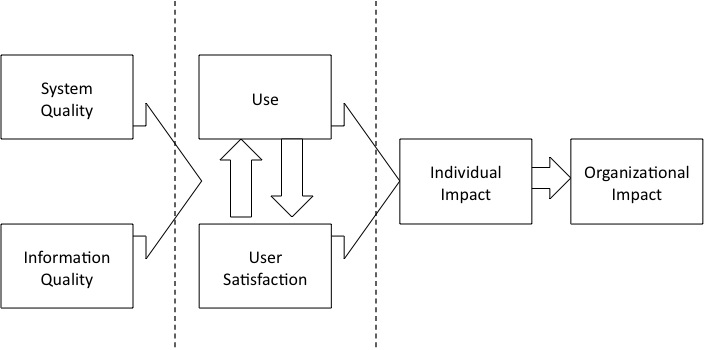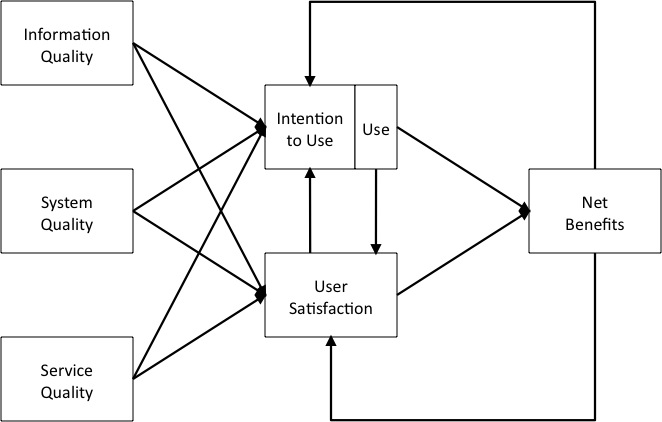Delone and McLean IS success model

Delone and McLean IS success model
Acronym
n/a
Alternate name(s)
DeLone & McLean Information Systems Success Model, DeLone & McLean IS Success Model, D&M IS Success Model
Main dependent construct(s)/factor(s)
Net Benefits, (Intention to) Use, User Satisfaction
Main independent construct(s)/factor(s)
System Quality, Information Quality, Service Quality
Concise description of theory
In order to provide a general and comprehensive definition of IS success that covers different perspectives of evaluating information systems, DeLone and McLean reviewed the existing definitions of IS success and their corresponding measures, and classified them into six major categories. Thus, they created a multidimensional measuring model with interdependencies between the different success categories (DeLone & McLean 1992).
Motivated by DeLone and McLean’s call for further development and validation of their model, many researchers have attempted to extend or respecify the original model. Ten years after the publication of their first model and based on the evaluation of the many contributions to it, DeLone and McLean proposed an updated IS success model (DeLone & McLean 2002, 2003).
The updated model consists of six interrelated dimensions of IS success: information, system and service quality, (intention to) use, user satisfaction, and net benefits. The arrows demonstrate proposed associations between the success dimensions. The model can be interpreted as follows: A system can be evaluated in terms of information, system, and service quality; these characteristics affect the subsequent use or intention to use and user satisfaction. As a result of using the system, certain benefits will be achieved. The net benefits will (positively or negatively) influence user satisfaction and the further use of the information system.
Diagram/schematic of theory

Information Systems Success Model (DeLone & McLean 1992)

Updated Information Systems Success Model (DeLone & McLean 2002, 2003)
Originating author(s)
DeLone & McLean (1992); DeLone & McLean (2002); DeLone & McLean (2003)
Seminal articles
DeLone, W.H., and McLean, E.R. 1992. "Information Systems Success: The Quest for the Dependent Variable," Information Systems Research (3:1), pp 60-95.
DeLone, W.H., and McLean, E.R. 2002. "Information Systems Success Revisited," in: Proceedings of the 35th Hawaii International Conference on System Sciences (HICSS 02). Big Island, Hawaii: pp. 238-249.
DeLone, W.H., and McLean, E.R. 2003. "The DeLone and McLean Model of Information Systems Success: A Ten-Year Update," Journal of Management Information Systems (19:4), Spring, pp 9-30.
Originating area
Information Systems
Level of analysis
Individual, Organization
IS articles that use the theory
Almutairi, H., and Subramanian, G.H. 2005. "An Empirical Application of the DeLone and McLean Model in the Kuwaiti Private Sector," Journal of Computer Information Systems (45:3), Spring, pp 113-122.
Bharati, P. and Chaudhury, A. (2006), “Product Customization on the Web: An Empirical Study of Factors Impacting Choiceboard User Satisfaction,” Information Resources Management Journal, Vol. 19, No. 2, pp. 69 - 81.
Bharati, P. and Berg, D. (2005), “Service Quality from the Other Side: Information Systems Management at Duquesne Light”, International Journal of Information Management, Vol. 25, No. 4, pp. 367-380.
Bharati, P. and Chaudhury, A. (2004), “An Empirical Investigation of Decision-Making Satisfaction in Web-Based Decision Support Systems”, Decision Support Systems, Vol. 37, No. 2, pp. 187-197.
Bharati, P. and Berg, D. (2003), “Managing Information Technology for Service Quality: A Study from the Other Side”, IT and People, Vol. 16, No. 2, pp. 183-202.
Bharati, P. (2002-2003), “People and Information Matter: Task Support Satisfaction from the Other Side”, Journal of Computer Information Systems, Winter.
Chae, H.-C.M. 2007. "Is Success Model and Perceived It Value," in: Proceedings of the 13th Americas Conference on Information Systems (AMCIS 07). Keystone, CO, USA.
DeLone, W.H., and McLean, E.R. 2004. "Measuring E-Commerce Success: Applying the DeLone & McLean Information Systems Success Model," International Journal of Electronic Commerce (9:1), Fall, pp 31-47.
Halawi,L.A, McCarthy,R. V and Aronson, J. E. 2007-2008. "An Empirical Investigation of Knowledge Management Systems Success”. Journal of Computer Information Systems (JCIS) Winter, 121-135.
Hu, P.J.-H. 2003. "Evaluating Telemedicine Systems Success: A Revised Model," in: Proceedings of the 36th Hawaii International Conference on System Sciences (HICSS 03). Big Island, Hawaii.
Hwang, M., and McLean, E.R. 1996. "The Use of Meta-Analysis in Validating the DeLone and McLean Information Systems Success Model," in: Proceedings of the 29th Hawaii International Conference on System Sciences (HICSS 96). Big Island, Hawaii.
Iivari, J. 2005. "An Empirical Test of the DeLone-McLean Model of Information System Success," The DATA BASE for Advances in Information Systems (26:2), pp 8-27.
Jennex, M., Olfman, L., Panthawi, P., and Park, Y.-T. 1998. "An Organizational Memory Information Systems Success Model: An Extension of DeLone and McLean's I/S Success Model " in: Proceedings of the 31st Hawaii International Conference on System Sciences (HICSS 98). Big Island, Hawaii.
Jennex, M., and Olfman, L. 2003. "A Knowledge Management Success Model: An Extension of DeLone and McLean’s Is Success Model," in: Proceedings of the 9th Americas Conference on Information Systems (AMCIS 03). Tampa, Florida.
Kulkarni, U.R., Ravindran, S., and Freeze, R. 2006. "A Knowledge Management Success Model: Theoretical Development and Empirical Validation," Journal of Management Information Systems (23:3), 12, pp 309-347.
Mao, E., and Ambrose, P. 2004. "A Theoretical and Empirical Validation of Is Success Models in a Temporal and Quasi Volitional Technology Usage Context," in: Proceedings of the 10th Americas Conference on Information Systems (AMCIS 04). New York City, New York.
McGill, T., Hobbs, V., and Klobas, J. 2003. "User-Developed Applications and Information Systems Success: A Test of DeLone and McLean's Model," Information Resources Management Journal (16:1), p 24.
Molla, A., and Licker, P.S. 2001. "E-Commerce Systems Success: An Attempt to Extend and Respecify the DeLone and MacLean Model of Is Success," Journal of Electronic Commerce Research (2:4), pp 131-141.
Pare, G., Aubry, D., Lepanto, L., and Sicotte, C. 2005. "Evaluating Pacs Success: A Multidimensional Model," in: Proceedings of the 38th Hawaii International Conference on System Sciences (HICSS 05). Big Island, Hawaii.
Qian, Z., and Bock, G.-W. 2005. "An Empirical Study on Measuring the Success of Knowledge Repository Systems," in: Proceedings of the 38th Hawaii International Conference on System Sciences (HICSS 05). Big Island, Hawaii.
Rai, A., Lang, S.S., and Welker, R.B. 2002. "Assessing the Validity of Is Success Models: An Empirical Test and Theoretical Analysis," Information Systems Research (13:1), pp 50-69.
Roldán, J.L., and Leal, A. 2003. "A Validation Test of an Adaptation of the DeLone and McLean’s Model in the Spanish EIS Field," in: Critical Reflections on Information Systems: A Systemic Approach, J.J. Cano (ed.). Hershey, PA, USA: Idea Group Publishing, pp. 66-84.
Rosemann, M., and Vessey, I. 2005. "Linking Theory and Practice: Performing a Reality Check on a Model of Is Success," in: Proceedings of the 13th European Conference on Information Systems (ECIS 05). Regensburg, Germany.
Seddon, P.B. 1997. "A Respecification and Extension of the DeLone and McLean Model of Is Success," Information Systems Research (8:3), pp 240-253.
Seddon, P.B., and Kiew, M.-Y. 1994. "A Partial Test and Development of the DeLone and McLean Model of Is Success," in: Proceedings of the 15th International Conference on Information Systems (ICIS 94). Vancouver, Canada: pp. 99-110.
Seddon, P.B., Staples, S., Patnayakuni, R., and Bowtell, M. 1999. "Dimensions of Information Systems Success," Communication of the AIS (2), pp 1-60.
Sedera, D. 2006. "An Empirical Investigation of the Salient Characteristics of Is-Success Models," in: Proceedings of the 12th Americas Conference on Information Systems (AMCIS 06). Acapulco, Mexico.
Seen, M., Rouse, A.C., and Beaumont, N. 2007. "Explaining and Predicting Information Systems Acceptance and Success: An Integrative Model," in: Proceedings of the 15th European Conference on Information Systems (ECIS 07). St Gallen, Switzerland.
Skok, W., Kophamel, A., and Richardson, I. 2001. "Diagnosing Information Systems Success: Importance-Performance Maps in the Health Club Industry," Information & Management (38:7), pp 409-419.
Thomas, P. 2006. "Information Systems Success and Technology Acceptance within Government Organization," in: Proceedings of the 12th Americas Conference on Information Systems (AMCIS 06). Acapulco, Mexico.
Urbach, N., Smolnik, S., and Riempp, G. 2008. "A Methodological Examination of Empirical Research on Information Systems Success: 2003 to 2007," in: Proceedings of the 14th Americas Conference on Information Systems (AMCIS 2008). Toronto, Ontario, Canada.
Wu, J.-H., and Wang, Y.-M. 2006. "Measuring Kms Success: A Respecification of the DeLone and McLean's Model," Information & Management (43:6), pp 728-739.
Links from this theory to other theories
Multi-motive information systems continuance model (MISC)
Technology acceptance model
Unified theory of acceptance and use of technology
External links
[1] Information Systems Effectiveness Home Page
Original Contributor(s)
Nils Urbach & Benjamin Müller
Please feel free to make modifications to this site. In order to do so, you must register.
Return to Theories Used in IS Research